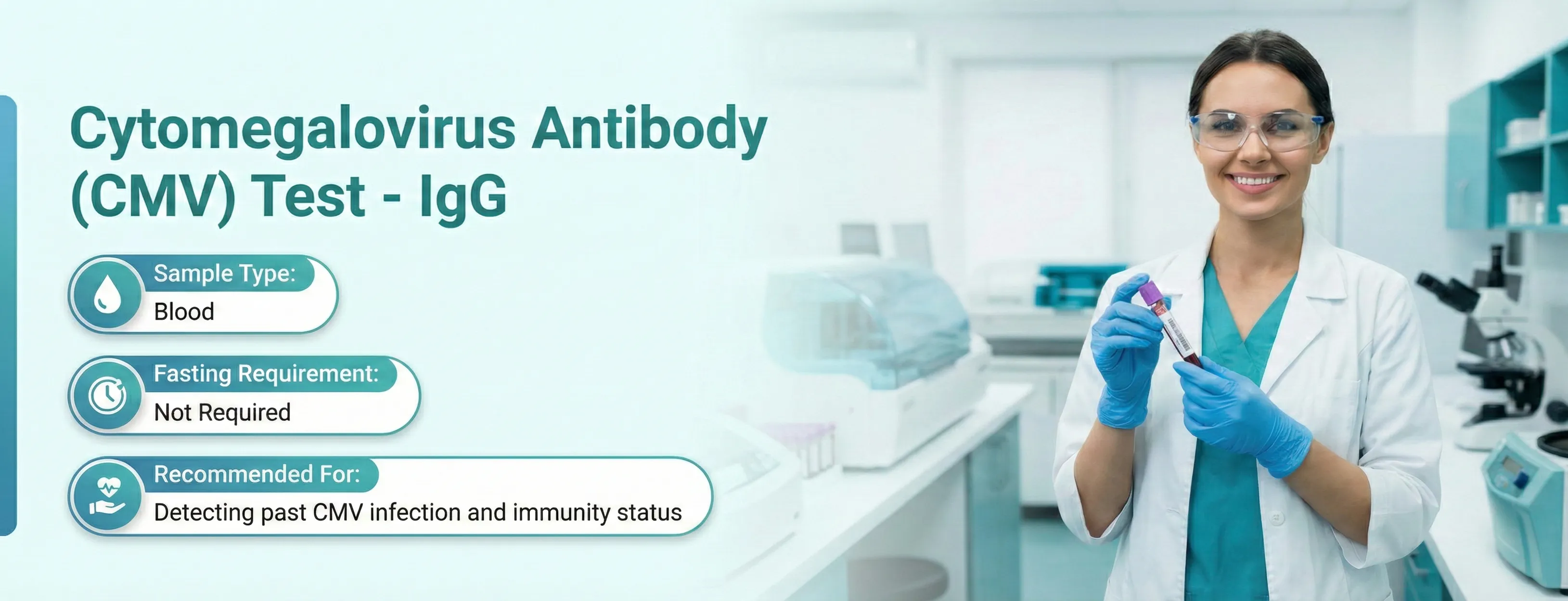14+ orders placed in your location
100% NABL & ISO Certified Lab • 100% Accurate Reports
Cytomegalovirus Antibody (CMV) Test - IgG
CMV blood test, CMV IgG Test, Cytomegalovirus Antibody IgG Test, CMV Antibody IgG Test
- SummaryThe CMV IgG test detects IgG antibodies against Cytomegalovirus, indicating a past infection or long-term immunity. It is especially important during pregnancy to assess the risk of transmitting CMV to the fetus and in immunocompromised patients. The test is done using a blood sample, and fasting is not required.The CMV IgG test detects IgG antibodies against Cytomegalovirus, indicating a past infection or long-term immunity. It is especially important during pregnancy to assess the risk of transmitting CMV to the fetus and in immunocompromised patients. The test is done using a blood sample, and fasting is not required.Read more
- Reports Within18 HrsView Sample Report100% NABL & ISO Certified Labs
- SampleBlood
- AgeAll Age Group
- GenderMale and Female
- FastingNot Required
PharmEasy Promises
Know More About The Test
A quick info on Cytomegalovirus Antibody (CMV) Test - IgG
Overview
Cytomegalovirus infection is caused by cytomegalovirus (CMV). It spreads when we come in direct contact with the saliva, blood, breast milk, semen or any body fluid of the infected person. It can also be spread by touching the objects and things of an infected person. It can be passed from mother to child during pregnancy.
The immune system of our body produces antibodies (CMV IgG and CMV IgM) against the cytomegalovirus. Some antibodies remain in the body even after recovering from the CMV infection. The CMV antibody IgG test detects these IgG antibodies in the blood. Once you get the infection (primary infection), the virus will remain in the body for life in an inactive form. As soon as the immunity of the body becomes weak, the virus reactivates and causes illness.
CMV infection can affect men and women of all ages. Usually, CMV infection does not cause any serious health issues. Most people don’t even know they have the infection. In some people, it can cause symptoms like that of the common flu, extreme fatigue, fever, chills, headache and body pain. They usually resolve in a few days or weeks.
CMV infection can cause serious health problems in pregnant women. It can spread to the baby and can cause vision or hearing problems, pneumonia, jaundice, anaemia and delay the mental development of the newborn. Sometimes, it can cause the death of a baby before or during the delivery (stillbirth).
CMV infection can cause serious health issues in people with weak immune systems. Those who have HIV/AIDS infection, going for organ transplants and having chemotherapy for cancer treatment. They have a weak immune response. CMV can affect the eyes, lungs, brain, liver or spleen. It can also lead to other infections as it further suppresses the immunity of the body.
The CMV antibody test is prescribed in pregnancy, blood transfusion cases, organ transplant cases and cancer therapy to avoid any complications. The number of CMV infections is high in both developed and developing countries. In India, it has been reported that 80-90% of the adult population has CMV. The infection is more common in pregnant women. It is a major public health issue. CMV requires health policies to prevent its spread. Currently, there is no vaccine available for CMV.
Other names of CMV IgG Test
- CMV IgG Test
- Cytomegalovirus Antibody IgG Test
- CMV Antibody IgG Test
- Cytomegalovirus IgG Test
- Cytomegalovirus Blood Test
- CMV Blood Test
- CMV serum Test
- Cytomegalovirus Serologic Test
What does the CMV Antibody IgG Test detect or measure and who is this prescribed for?
The CMV Antibody IgG Test detects the IgG antibodies developed by the immune system of our body in response to CMV infection.
If a person is experiencing symptoms like:
- High fever
- Loss of appetite
- Headache
- Muscle pain
- Fatigue
- Body pain
- Sore throat
- Swelling in lymph nodes
The CMV Antibody IgG Test is prescribed by the consulting physician. CMV testings may also be prescribed to a newborn child if it has:
- CMV-infected mother
- Yellow eyes and skin (Jaundice)
- Low count of platelet
- Pneumonia
- Enlarged liver or spleen
- Hearing problem
- Vision problem
- Small head
- Seizures
- Delay in the mental development of the baby
The consulting doctor may prescribe the CMV antibody IgG Test in the following conditions:
- During pregnancy
- HIV/AIDS infection
- Organ transplantation (both donor or receiver)
- Bone marrow transplantation (both donor and receiver)
- Cancer
- Chemotherapy
The CMV antibody IgG test results will help with the diagnosis of CMV infection. If the infection is present, antiviral medicines are prescribed by the consulting physician. In pregnant women, a CMV IgG avidity test is also done to identify primary CMV infection. The test is used across the globe and is considered a gold standard for primary CMV infection.
The CMV antibody test is also part of the TORCH screening. TORCH means toxoplasmosis, rubella, cytomegalovirus, herpes simplex and HIV infection. The TORCH screen result will show the presence or absence of antibodies IgG or IgM against one or more of the above-mentioned infections. The CMV antibody IgG test is suitable for both genders of age above 12 months.
Sample Type
CMV IgG test required a blood sample.
Test Preparation
The CMV Antibody IgG Test is a blood test that does not require fasting or any specific preparation. To collect a blood sample, a needle or syringe is used. The blood is withdrawn from a prominent vein of the forearm. The procedure requires no more than 5 minutes. The sample is then sent to the laboratory and the result will arrive in 1 to 2 days.
It is advised to inform your doctor about all the ongoing medicines before the test.
Test inclusions: What parameters are included?
The parameters of the CMV Antibody IgG Test include:
- Presence of CMV antibody IgG
- Amount of CMV antibody IgG
The test is applicable for a person with an age equal to or more than 12 months (at this age, antibodies from the mother disappear). The results of the CMV Antibody IgG Test are expressed as CMV IgG positive and CMV IgG negative. If CMV antibodies are found in the blood sample, it is considered CMV IgG positive. If CMV antibodies are not found in the blood sample, it is considered CMV IgG negative.
How frequently should you take this test?
A CMV Antibody test is used to diagnose past or current CMV infection by detecting the IgG and IgM antibodies against it. It is not tested on everyone. It is mainly prescribed to an immunocompromised person with symptoms like that of common flu, pregnant women and people undergoing organ transplant surgery. The doctor may ask you to repeat the test after two weeks or more to check the status of the infection and CMV antibodies.
Risk Assessment
Cytomegalovirus Infection, Recurrent CMV infection
Ranges
CMV IgG level | Result | Interpretation |
0.8 AI or less | Negative | No significant level of detectable antibody found |
0.9-1.0 AI | Equivocal | Repeat the test after 10-14 days |
1.1 AI or greater | Positive | CMV IgG antibody detected, which indicates current or past CMV infection |
What is a normal CMV IgG level?
The CMV IgG level is
- 0.8 AI or less (Negative)- No detectable antibodies were found
- 0.9-1.0 (Equivocal)- Repeat the test after 2 weeks or 10-14 days.
- 1.1 or more(Positive)- Detectable antibodies present
Test Result Interpretaion
The interpretation of the CMV IgG Test result will be:
- Negative: If the level of CMV IgG antibodies is less than 0.8 AI which means the person is not infected by CMV, recently or in the past.
- Positive: If the level of CMV IgG antibodies is more than 1.1 AI it means the person is infected with CMV infection, recently or in the past.
- Equivocal: If the level of CMV IgG antibodies is 0.9 to 1.1AI. The test is repeated after 10-14 days.
The diagnosis of CMV infection will depend upon the presence and absence of both CMV IgG and CMV IgM antibodies in the blood. They will help in identifying whether it is a recent infection or a past infection.
The CMV IgM is produced as the first response of our body to CMV infection. They can be detected within 1 or 2 weeks after the infection. After that, the antibodies will decrease and fall below the detectable level. Once the inactive virus reactivates in the body, the CMV IgM antibody level will increase again.
The CMV IgG antibodies are produced several weeks after the CMV infection. Initially, they rise, but later they become stable. Once you get infected with CMV infection, the CMV IgG antibodies will remain at a detectable level in the blood for a lifetime.
The CMV infection will be interpreted by the CMV antibody test results as:
- Negative CMV IgG + Negative CMV IgM- No CMV infection recent or in the past
- Negative CMV IgG + Positive CMV IgM- Recent primary CMV infection
- Positive CMV IgG + Negative CMV IgM- CMV infection in the past
- Positive CMV IgG + Positive CMV IgM- Recurrence of CMV infection or Active CMV infection
Was This Test Information Helpful?
Please rate your experience
References
People Also Ask
Is CMV IgG bad?
What happens if cytomegalovirus IgG is high?
How is CMV IgG positive treated?
What happens if you are CMV-positive?
Have any doubts? Ask us.
Ask us anything about the Cytomegalovirus Antibody (CMV) Test - IgG to understand it better
We provide trusted, expert-curated health content to support better awareness,prevention, and care.
Backed by experienced doctors, medical experts, and strict editorial standards.


